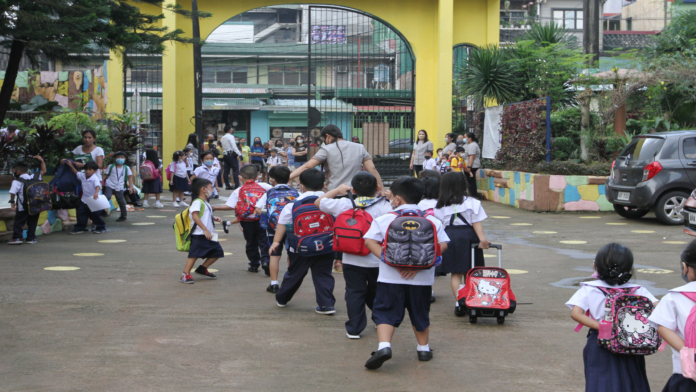The measure that includes kindergarten and elementary school students in the coverage of government assistance and subsidies to private schools would help decongest public schools, a House leader said on Tuesday.
During the Bagong Pilipinas Ngayon briefing over PTV4, House Committee on Basic Education and Culture chair Rep. Roman Romulo of Pasig City’s Lone District, said the proposal that would expand the application of the Government Assistance to Students and Teachers in Private Education (GASTPE) will also complement the Department of Education’s (DepEd) Public and Private Education Complementarity Framework in its goal of decongesting public schools.
“Sa kasalukuyan po kasi, ang ating mga DepEd schools ay punong-puno na po ng estudyante, pero ang voucher system natin ay para sa Grades 7 to 10 at dahil sa K to 12 program nagkaroon din po voucher system sa 11 and 12 (Currently, our DepEd schools are completely packed with students. However, our voucher system is only for Grades 7 to 10 and since we have the K to 12 program, we also have a voucher system for [Grades] 11 to 12,” he said.
Romulo, however, pointed out that the bulk of the entire student population in the Philippines is in elementary schools.
The complementarity approach between public and private schools would help address overcrowding in public schools and classroom backlog, he added.
“So, hopefully po, with the passage po of this E-GASTPE law, expanded E-GASTPE law ay magkakaroon talaga ng complimentary partnership po talaga ang public and private schools natin (there would be a complimentary partnership between our public and private schools),” he said.
Under the proposed measure, the government will provide vouchers to recognized private basic education schools for kindergarten, elementary, and secondary students.
“At pag napasa po itong bill na ito ay puwede po nating mahingan ng tulong, magkaroon ng tunay na partnership. Para iyong mga hindi na talaga kakasya po sa DepEd schools natin ay makapag-enroll rin dito sa ating mga private schools (If this bill is enacted into law, we could ask [private schools] for help and establish a real partnership. So that those who can’t be accommodated by our DepEd schools can be enrolled in private schools),” he said.
The voucher assistance for students would be based on tuition and other fees charged by the schools, and the socio-economic needs of each student, according to the proposal approved by the House Committee on Basic Education and Culture.
Most vulnerable and underprivileged students, or those belonging to the bottom first to fifth income deciles, as determined by the Philippine Statistics Authority (PSA), shall be prioritized for the program. The priority students would receive a higher voucher amount.
The participating private basic education schools, meanwhile, shall receive assistance based on the percentage of priority students in the school, the overall performance of the schools based on the rankings of its students in national and international assessments, and the geographic spread and size of student enrollment.
Meanwhile, the Public and Private Education Complementarity Framework shall serve as the foundation to guide and support DepEd towards addressing the gaps in the public and private sectors of education.
Last week, Vice President and Education Secretary Sara Z. Duterte, in her message read by DepEd Assistant Secretary Revsee Escobedo, cited the launch of the framework as “another step forward” in transforming basic education in the Philippines.
“By working together, we can decongest public schools and expand access to quality education for students from low income families,” Duterte said.
“Clearly, our public schools cannot address the education crisis alone. Private schools have a pivotal role in addressing the challenges we face today. Our private schools’ expertise, innovation, and commitment to provide quality education for our students have helped shape Filipino society,” she added. (PNA)


